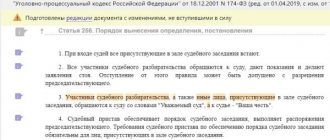Witness testimony in writing (explanation to the court). A witness is a person who may know any information about circumstances relevant to the consideration and resolution of the case. Information provided by a witness is not evidence if he cannot indicate the source of his knowledge.
The person applying to call a witness must indicate what circumstances relevant to the consideration and resolution of the case can be confirmed by the witness, and inform the court of his name, patronymic, surname and place of residence. Witness testimony is a witness's oral communication to the court about circumstances known to him that are important for the proper consideration and resolution of an administrative case. At the suggestion of the court, a witness who has given evidence orally may present it in writing. Witness testimony, presented in writing, is attached to the materials of the administrative case.
The following are not subject to questioning as witnesses: 1) representatives in a civil case, or defense attorneys in a criminal case, an administrative offense case, or mediators - about circumstances that became known to them in connection with the performance of the duties of a representative, defense attorney or mediator; 2) judges, jurors or arbitration assessors - about issues that arose in the deliberation room in connection with the discussion of the circumstances of the case when making a court decision or sentence; 3) clergy of religious organizations that have passed state registration - about the circumstances that became known to them from confession. The following persons have the right to refuse to testify: 1) a citizen against himself; 2) spouse against spouse, children, including adopted children, against parents, adoptive parents, parents, adoptive parents against children, including adopted children; 3) brothers, sisters against each other, grandfather, grandmother against grandchildren and grandchildren against grandfather, grandmother; 4) deputies of legislative bodies - in relation to information that became known to them in connection with the exercise of deputy powers; 5) The Commissioner for Human Rights in the Russian Federation - in relation to information that has become known to him in connection with the performance of his duties; 6) Commissioner under the President of the Russian Federation for the protection of the rights of entrepreneurs, commissioners for the protection of the rights of entrepreneurs in the constituent entities of the Russian Federation - in relation to information that has become known to them in connection with the performance of their duties.
A person who may be aware of the circumstances of the case to be established may be called as a witness in a case of an administrative offense.
The witness is obliged to appear when summoned by the judge, body, or official who is prosecuting the case of an administrative offense, and to give truthful testimony: to report everything known to him about the case, to answer the questions posed and to certify with his signature in the appropriate protocol that his testimony was recorded correctly.
A witness has the right: 1) not to testify against himself, his spouse and close relatives; 2) give evidence in their native language or in a language they speak; 3) use the free assistance of a translator; 4) make comments regarding the correctness of recording his testimony in the protocol.
When interviewing a minor witness under the age of fourteen, the presence of a teacher or psychologist is required. If necessary, the interview is conducted in the presence of the legal representative of the minor witness.
The witness is warned of administrative liability for giving knowingly false testimony.
For refusal or evasion of the duties provided for in Part 2 of Article 25.6 of the Code of Administrative Offenses, the witness bears administrative liability as provided for in this Code.
Who can be a witness in a civil case?
Testimony is an oral report by a witness about the facts known to him, which help to objectively make a decision in a given case. The testimony is recorded by the secretary in the minutes of the meeting.
According to Article 69 of the Code of Civil Procedure of the Russian Federation, any citizen who, for one reason or another, became aware of the circumstances of the case, can act as a witness. He undertakes to inform the court of all information known to him.
The following cannot act as witnesses:
- priests (according to information received at confession);
- court employees, jurors (according to information that became known during meetings on the case);
- defense representatives, mediators (for certain circumstances related to specific cases).
Witnesses may not testify against themselves or close relatives.
You shouldn't call a large number of people. Usually, one witness per specific circumstance that is of significant importance to the case is sufficient. But for reinsurance and better clarification, you can imagine two or three citizens.
It is worth considering that if a witness cannot come to the courtroom for good reasons (serious illness, old age, disability), then he is questioned by law enforcement officials at his place of residence.
About witnesses in the Code of Civil Procedure of the Russian Federation
Any citizen who is aware of the circumstances of the case, who may be an eyewitness to the event or who learned about the event from third parties, has the right to act as a witness in court. In the latter case, he is obliged to inform the court who and when told him this information. In the case of children and the incompetent, if they are unable to assess the consequences of their actions, their participation as a witness is prohibited.
Procedure for questioning witnesses
According to Article 177 of the Code of Civil Procedure of the Russian Federation, each witness is questioned separately. He can also be questioned through the use of video conferencing systems. The judge ascertains the witness’s relationship to the participants in the case and offers to provide the court with information about the circumstances of the case. If evidence is in doubt, litigants may ask questions. The person at whose request the witness was called, the representative of this person, and then the other participants and their representatives ask questions first. The judge has the right to ask questions to the witness at any time during his interrogation. If necessary, the court may re-examine the witness in the same or subsequent court hearings, as well as re-examine him to clarify contradictions in their testimony. An interrogated witness may leave the courtroom before the end of the trial if the court does not require his further participation.
Forms of false witness testimony
In accordance with the first part of Article 70 of the Code of Civil Procedure of the Russian Federation, a citizen who is summoned to court for questioning as a witness is obliged to appear and truthfully tell about the facts known to him. Personal presence in the courtroom is necessary so that the judge can look at the witness, evaluate his behavior and the veracity of his testimony. The person is also notified of criminal liability for giving false testimony. One must distinguish between perjury and delusion.
Perjury is the purposeful provision of false information. In this case, the witness can both distort some circumstances and speak generally fictitious facts, but do this consciously. Reasons for such behavior can include profit, revenge, disgust and fear. However, it is worth noting that perjury under the influence of threats is viewed from a different angle than for the sake of self-interest.
If a person reports information and does not realize that it is unreliable, then this is a misconception. It is very important that the witness be a person who is not interested in the court's verdict.
Accompanying minors during interrogations
The age at which a child can be brought into questioning as a witness is not limited by law. Obviously, if the baby does not yet know how to speak, he is not suitable for this role. If this is a preschooler who still does not really speak, then the decision on the advisability of interrogation must be made by the investigator.
When interrogating children, investigators and judges need to take into account a number of age-related psychological characteristics:
- desire to look better in the eyes of adults;
- the desire not to let down or betray friends;
- little life experience and amount of knowledge;
- greater suggestibility;
- the ability to quickly forget events, especially negative ones;
- shyness and increased emotional excitability.
All these specific features of the child’s psyche can affect the reliability and correctness of testimony during interrogation.
Unless questioning is absolutely necessary, it is best not to aggravate the emotional trauma of a child witness to a crime by reminding him of the events he saw. The interrogation of a child, if he is recognized as a suspect or victim, is carried out in all cases where this is possible.
When investigating sexual crimes, all interrogations of children under 16 years of age must be attended by a teacher or psychologist called as a consulting specialist through an educational institution.
When questioning a witness under the age of 14, a teacher or child psychologist must also be present in court. He may ask questions regarding the case file or the personal circumstances of the minor. For a 14-16 year old witness, the court may also invite a teacher if it considers that his participation is appropriate.
If you are interested in children's involvement in child support cases, read about it here. You can learn more about adoption issues in this article.
Sources:
Code of Civil Procedure of the Russian Federation. Article 179. Interrogation of a minor witness
Code of Criminal Procedure of the Russian Federation. Article 5, clause 12. Legal representatives. Clause 12
Code of Civil Procedure of the Russian Federation. Article 37. Civil procedural capacity
How to draw up a petition to call witnesses in a civil case
In accordance with Article 35 of the Code of Civil Procedure of the Russian Federation, citizens who participate in the process of considering the case can submit petitions. This type of application does not have a strict form or form, but it must contain some data.
The first thing you need to write is the full name of the court and who is filing the petition.
Then, in the body of the application, the civil case number is indicated and the contents are briefly described; information about the plaintiff and defendant is provided.
Next, it is necessary to provide the details of all witnesses whom, in the opinion of the applicant, the court should question. It is also necessary to provide facts or circumstances that this witness can confirm. Add date and signature.
The full name of the witness and residential address must be indicated. In no case should the document be compiled with grammatical errors, inaccuracies, corrections or incorrect wording. This may result in the application being rejected.
Written testimony
Sample explanation of a witness to the Head of the Moscow Traffic Police, Police Lieutenant Colonel Mr. Polyakov B.E. from gr. Rusinov Artem Aleksandrovich living at the address: Moscow, st. Lenina 7-1 work phone: +7 929-925-15-14
Witness's testimonies
For refusal, evasion from giving an explanation or for giving knowingly false explanations under Art. 17.9 and 25.6 of the Code of Administrative Offenses of the Russian Federation warned. I was also explained the right not to testify against myself, my family members and my close relatives. ______________ Signature
Y. Rusinov Artem Aleksandrovich, living: Moscow, st. Lenina 7-1, ud. identity No. 5789 445588, I confirm that “__” ___20__ was in the car with the DRIVER’S NAME at approximately __:___. further we describe the event which you witnessed _____________________ ___________________________________________________________________
I have a driver's license, have been driving a car for several years, and am able to assess the traffic situation and traffic conditions. I confirm that I have no personal interest in the outcome of the case. I am not related to the DRIVER's name and am not financially dependent on him.
Full name _____________ date _____________
RAA Law
Free legal consultation by phone
Where and when to file a motion to call witnesses
The petition can be submitted to the court before the start of the trial and attached to the claim. You can submit an application to the court office or send it by mail. It is sent as a registered letter with a description of the attachment. In this case, the plaintiff will have confirmation that he went to court. If the applicant submits the application in person, then it is necessary to have a copy with him. This is necessary so that it is stamped, dated and signed by the person who accepted it.
You can also submit a petition directly at the hearing at any time. But before the trial itself, the judge always hears requests from people involved in the case. Be prepared for the fact that a verbal request must be confirmed with a written document. It is worth preparing as many copies of the application as there are persons involved in this case.
The best time to file a motion is when the case is preparing for hearing. This will give more confidence that the court will not reject it, since there will be enough time to find and call a witness for questioning. It is important to note that if the plaintiff makes a request during the trial, the judge will raise the issue for discussion between the parties. In this case, all participants in the process have the right to express their opinion about the possible interest of this witness, or incomplete awareness due to any circumstances; or they may provide other information that will cast doubt on the latter’s testimony.
Explanations of parties and third parties in civil proceedings
The law recognizes information provided by interested participants in the process about the circumstances of the case as an independent means of proof (Article 68 of the Code of Civil Procedure of the Russian Federation, Article 81 of the Arbitration Procedure Code of the Russian Federation).
Explanations of the parties and third parties are one of the means of evidence in civil proceedings. In Part 1 of Art. 55 of the Code of Civil Procedure defines the means of proof through which it is possible to establish factual circumstances that are important for the correct consideration and resolution of the case. They also include explanations of applicants and interested parties in cases of special proceedings, as well as persons who filed complaints in cases arising from administrative-legal relations.
Explanations of the parties may be provided in writing or orally. Oral explanations can be used as evidence only if the participant in the civil process personally gave them directly at the court hearing and are entered into the minutes of the court session. Written explanations of the parties, clarifications, reviews can be provided to the court personally or by a representative directly during the process, as well as through the expedition of the court.
Explanations of the parties are evidence to the extent that they contain any information about the circumstances of the case. Other statements of a person containing various kinds of petitions, considerations, assumptions, arguments of an emotional nature are not evidence, although they may indirectly reflect certain circumstances of the case and be taken into account by the judge.
Based on Part 1 of Art. 68 of the Code of Civil Procedure of the Russian Federation, explanations of the parties and third parties about circumstances known to them that are important for the correct consideration of the case are subject to verification and evaluation along with other evidence. The parties' explanations require careful verification and comparison with other evidence, since the parties are interested in resolving the case in their favor and may give not entirely reliable or distorted explanations.
If a party obligated to prove its claims or objections withholds the evidence in its possession and does not present it to the court, the court has the right to justify its conclusions with the explanations of the other party.
The explanation of the parties as a means of proof in civil proceedings is usually divided into three types: approval, admission, objection.
1. The statement contains information about facts, the existence of which is proven by the person approving himself. This is the most common type of explanation, which often consists only of statements in one’s favor. Affirmative explanations contain a party's demand or objection, which must be supported by other available evidence, or, if it is impossible to provide it, petition the court to request such evidence. 2. Confessional explanations – confirmation by a party, to the detriment of its own interests, of facts, the burden of proof of which lies with the other party.
Thus, a party has the right to admit all the facts of the basis of the claim or objections to the claim (full admission) or some of the specified facts (partial admission).
Confession has its own legal consequences. Recognized facts become indisputable, which frees the other party from the need to further prove them. The confession is either recorded in the minutes of the court hearing or stated in a written statement. But if the confession contains a statement of any other additional facts not provided by the opposing party, they are not proven and are subject to additional proof.
A person can admit the claims, but with a reservation, which seems to negate the very essence of the admission made. For example, the defendant admits the fact that the plaintiff actually lent him the required amount of money, but the demand for repayment of the debt is extinguished by the expiration of the statute of limitations. In this case, the limitation period must be proven by the person making the confession.
A situation is possible when the court has reason to believe that the confession was made in order to conceal the actual circumstances of the case or under the influence of deception, violence, threats, or honest misconception, the court does not accept the confession, and a ruling is made about this. In this case, these circumstances are subject to proof on a general basis.
3.
Objection - This is a non-recognition of the position of the other side with the presentation of new factual information that refutes the arguments of the other side of the dispute.
During the court hearing, it is necessary to provide accurate and verified explanations. For example, accidentally confirmed facts may be entered into the minutes of the meeting and will be recognized by the party, which may subsequently lead to the court resolving the dispute not in your favor.
To obtain legal advice and represent your interests in court, call the Lawyer at tel.,
Who invites him?
A witness in a civil trial is invited either by the plaintiff or the defendant. But not only. A third party has the right to invite him. Most often, participants in the meeting are invited by the parties.
The legislation gives the court the right to apply procedural coercive measures if a witness fails to appear: arrest, imposition of a fine. In fact, their appearance is ensured entirely by the person who asks to summon them. If the witness does not appear, the judge will inquire about the reasons and continue the process. In civil proceedings, the drive is not used in reality or is used extremely rarely in exceptional cases.
However, depending on the meaning of the testimony, the judge may postpone the case or be satisfied with the testimony of those who have already been questioned earlier.
It is also possible that after studying the already collected materials of the case and the explanations of the parties, the representative of the authority will not postpone the date of the hearing again in order to listen to the witness.
In the case of an appeal hearing, the judge’s refusal to postpone the consideration of the case because of a witness is recognized as legal, unless the reason for failure to appear is considered valid.
Legal refusal to testify
The law specifies a list of persons who cannot be interrogated or interrogation is permitted only if they consent.
The first group includes:
- persons who took part in the case as a representative or defense attorney in criminal proceedings;
- mediators who took part in the reconciliation procedure;
- judges, jurors - regarding issues that were discussed in the deliberation room;
- clergy about the information that became known to them during confession.
The ban operates regardless of the desire of the listed persons to tell the court anything.
Below is a list of those who can testify if they agree:
- deputies about information that became known to them in the course of performing their duties;
- Commissioner for Human Rights in the Russian Federation;
- Commissioner for the rights of entrepreneurs at both the federal and regional levels;
- man in relation to himself;
- spouse against spouse, parents against children, children against parents;
- adopted children and adoptive parents in relation to each other;
- brothers and sisters in relation to each other;
- grandparents and grandchildren in relation to each other.
Is it possible to call witnesses without a petition?
Participants in a civil case can ensure the appearance of witnesses themselves, without prior notice to the court. However, to testify, you still need to make an oral or written request directly at the hearing. Until such a request is granted by the judge, the witness will be allowed into the hearing room. As with standard rules, the court must prove that the testimony will be relevant to the case. If the request is granted, the witness will be invited into the courtroom to provide explanations.
For any questions related to filing petitions and calling witnesses to court, you can get advice from our lawyers. We will explain the rules of law and judicial practice, and help you fill out the documents correctly. Contact us, we will find a way out even in the most difficult situation!
Invitation procedure
One of the parties declares a desire to question the witness. The application indicates the information that this person can provide, his full details (full name, place of residence).
The petition for summons may be filed together with the claim or combined in one document. There are also nuances here.
If a request to call a witness in a civil proceeding is indicated in the claim, it is placed in the pleading part.








